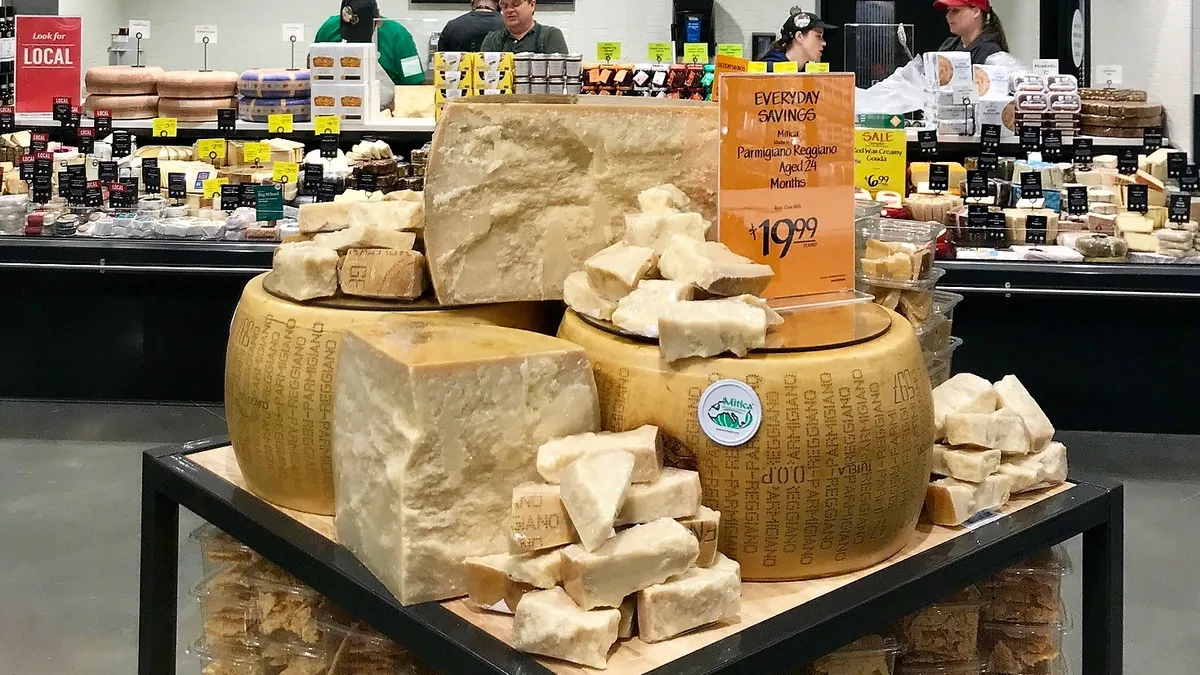Dive Brief:
- Specialty food retailers, distributors and importers are stockpiling imported European cheeses and other goods ahead of the Trump administration's 10% and 25% tariffs on $7.5 billion in EU goods, set to take effect Oct. 18, Reuters reported.
- Importers are bringing in millions of extra pounds of Parmigiano Reggiano and other hard cheeses in an attempt to beat the deadline, according to Reuters. One importer said he ordered $15 million in extra cheese with one year's shelf life.
- The tariffs set to go into effect next week come in addition to the 15% tariff already in place on EU imported cheese. Rabobank told the Dairy Reporter the total quantity of affected imports is roughly 107,000 metric tons of imported cheese (based on 2018 levels) with Italian cheese hit the hardest in terms of their total exported dairy products.
Dive Insight:
This isn't the first time this year food retailers have taken a serious look at stockpiling as a way to ward off trade uncertainty. British sellers have been doing so for months under the specter of Brexit. Now the U.S. is facing similar supply issues regarding French cheese and Scotch whiskey as a result of the new tariffs.
Stockpiling is one way to avoid tariffs and ensure there is enough supply to get through the long, cold, busy winter months ahead, but the practice comes with its own risks and drawbacks.
The first is the money needed to overbuy, which necessarily must be redirected from elsewhere. High holiday sales volume raises inventory and operational spend and with most food-selling operations running on single-digit margins, there isn't much room to play, said Kevin Krueger, procurement and sustainability manager for St. Jude's Research Hospital and former national buyer for Whole Foods Market.
Furthermore, Rod Daugherty, vice president of product strategy for supply chain software firm Blue Ridge, told Supply Chain Dive in February that how much to buy must be carefully balanced with how quickly the items will sell and if they have a finite shelf life, whether literally or for trend or seasonal reasons.
"Customers tend to like fresh product, so forward buying has limited benefits considering how perishable high quality cheese is," said Errol Schweizer, CEO of CPG brand Farmer Direct Organic and former vice president of grocery for Whole Foods Market.
Plus, excess inventory costs more to store, Krueger told Supply Chain Dive, and buyers rarely control the storage their purchases fill. Large buyers with power to wield may be able to work with distributors to acquire more space or even have their own cold storage warehouse network. But smaller retailers with little sway over distributors are unlikely to get first dibs on a product in short supply, leaving only the option of on-site storage — which in retail is optimized for customer experience and not back-of-house storage.
Even if the excess product makes it to the sales floor, said Krueger, "that six months that you have to keep rotating that product and counting that product and moving it around — there are costs associated with having that extra stuff around." Stockpiling often means buying more product from a single batch or lot, and that opens retailers up to food safety concerns and greater recall risk.
Still, Krueger said, if customers expect an item to be in stock, the consequences of running out are just as serious. The instinct to stockpile, he said, is understandable. "Customers are not likely to be understanding of your reasons for out of stocks — you have to balance that against a lot of other factors."
The more prudent move, said Schweizer, may be to raise prices and share the reasoning.
Stockpiling, he said, "will have a limited window of opportunity for importers, retailers and distributors and it's more relevant to start letting customers know that prices will increase and why. These tariffs will stretch the price and demand elasticity significantly, affecting forecasts for the following years to come."
This story was first published in our weekly newsletter, Supply Chain Dive: Procurement. Sign up here.













